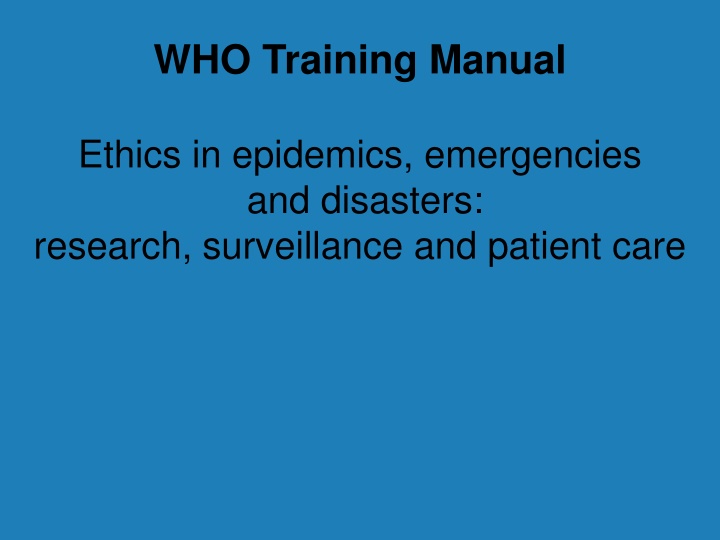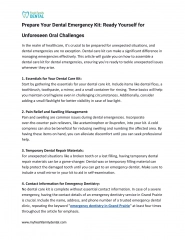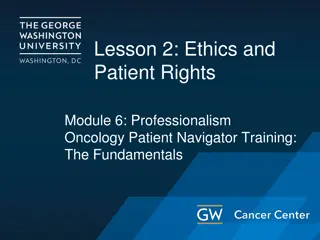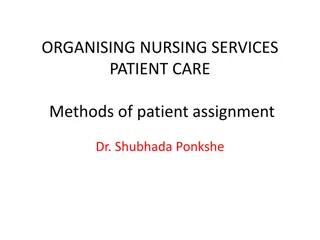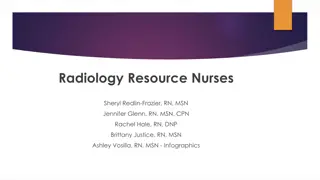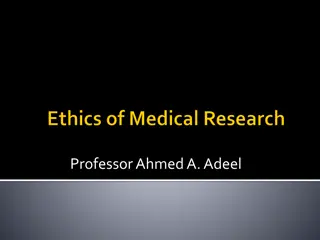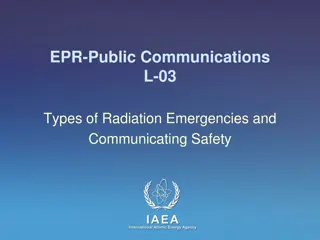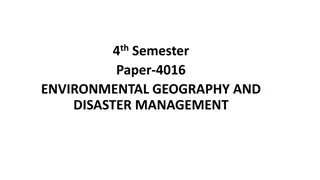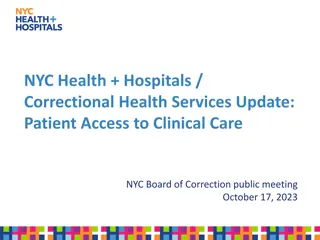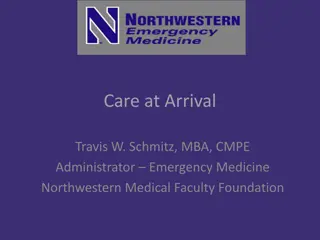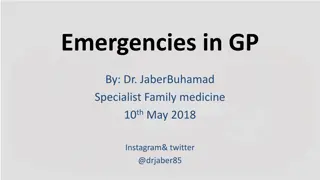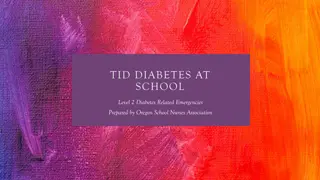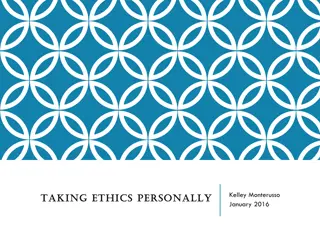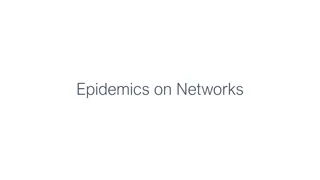Ethics in Epidemics & Emergencies: Research & Patient Care
This training manual delves into ethical considerations essential in epidemics, emergencies, and disasters, focusing on research, surveillance, and patient care. It covers core competencies, learning objectives, and ethical considerations in public health emergencies, discussing potential benefits and harms of emergency research.
Download Presentation

Please find below an Image/Link to download the presentation.
The content on the website is provided AS IS for your information and personal use only. It may not be sold, licensed, or shared on other websites without obtaining consent from the author.If you encounter any issues during the download, it is possible that the publisher has removed the file from their server.
You are allowed to download the files provided on this website for personal or commercial use, subject to the condition that they are used lawfully. All files are the property of their respective owners.
The content on the website is provided AS IS for your information and personal use only. It may not be sold, licensed, or shared on other websites without obtaining consent from the author.
E N D
Presentation Transcript
WHO Training Manual Ethics in epidemics, emergencies and disasters: research, surveillance and patient care
Core competence 4 Ability to identify conflict between the common good and individual autonomy in research and clinical trials during emergency response
Corresponding learning objectives Identify possible harm and benefit to individuals and communities resulting from conducting research in emergencies. Discuss moral theories, and identify frameworks applicable to research in emergencies. Explain the current norms under which a waiver of consent could be deemed acceptable for research in critical care settings, and assess when they could be applicable to research in emergencies. Explain the processes required to improve informed consent to research in emergencies, with particular consideration of traditional communities and low- resource settings. L.O. 1.1
Ethical considerations for the conduct of research in public health emergencies What scientific standards, if any, are we willing to compromise in order to respond quickly to a public health emergency? Who will bear the greatest risks associated with the use of unapproved treatments? Which project has the greatest potential for positive results for people at risk in a public health emergency? How do we decide who will receive first access to a newly developed, scarce treatment? L.O. 1.1
Potential benefits to individuals and communities of emergency research Rapid access Access to new and experimental drugs A robust scientific evaluation remains important Rapid access may depend on imaginative study design by researchers and regulators Natural experiments and a lower threshold of evidence have been suggested Better understanding of the condition Causes, transmission of disease, best treatment Improves medical outcomes and advances the development of new treatment L.O. 1.1
Potential harms to individuals and communities of emergency research Adverse effects Care must be taken that research interventions are safe and not initiated too quickly, ignoring potentially significant risks in order to get it out there Inefficiency If the resources for care are reallocated to research, some patients may not receive the care they otherwise expected Violation of rights Overriding individual liberty Unnecessary exposure to risk If a study is poorly designed, more participants might have to be exposed to the intervention in order to detect an effect L.O. 1.1
Ethical concepts and principles for the conduct of research in emergencies Ethical principles can assist decision-makers by helping to ensure that they consider relevant values and commitments They can be used to assess whether the balance of expected harm and benefit is correct L.O. 1.1
Ethical concepts and principles Autonomy respect for individuals and their liberties Concern for welfare patients, participants, populations Equity fair access to health resources Efficiency use of resources to maximize desired outcome and minimize waste Fair process inclusive, accountable and informed decision process Global justice fair and responsible practices between communities Reciprocity relationship of corresponding mutual action Social justice fair and responsible practices L.O. 1.1
Ethical concepts and principles Solidarity mutual global fellowship Transparency honest and accessible information Need for evidence Least restrictive alternative Proportionality Minimally burdensome Compensation Due (legal) process right of appeal Democratic/transparent policy making L.O. 1.1
Approaches to ethics in public policy Utilitarianism achieve the best outcome (in terms of aggregate human well-being utility ) Libertarianism respect individual liberty Egalitarianism promote equality (e.g., John Rawls, part of the difference principle : justice requires making those who are worst off as well off as possible) Rights based theories respect (human) rights L.O. 1.1
Value Pluralism Each of these approaches is presumably partly correct because the values they emphasize (utility, liberty, equality, rights) each matter. But what should be done in cases when there is conflict between these values? Presumably no one of these values should always trump all of the others (regardless of the degree to which the others are threatened) L.O. 1.1
Value Pluralism Whenever a given policy/action would maximally promote all of these values, then it is obvious what should be done. In cases of conflict between these values, we should aim to strike a balance between them. Accountability for Reasonableness Framework (Daniels) can provide guidance for fair decision- making L.O. 1.1
Waiver of consent in public health emergencies Waiver of consent can be granted for research interventions under certain conditions Usually limited to minimal risk studies Can be granted to studies to develop evidence-based practice in emergency situations if research cannot be done any other way L.O. 1.1
Types of research where waiver may be applicable Retrospective data collection Observational epidemiological research projects Urgent intervention without time to seek consent, or where patient unable to consent L.O. 1.1
When is waiver of consent permissible? Article 3.7 The Research Ethics Board (REB) may approve research without requiring that the researcher obtain the participant s consent where the REB is satisfied, and documents, that all of the following apply: the research involves no more than minimal risk to the participants; the lack of the participant s consent is unlikely to adversely affect the welfare of the participant; it is impossible or impracticable to carry out the research and to answer the research question properly, given the research design, if the prior consent of the participant is required; whenever possible and appropriate, after participation, or at a later time during the study, participants will be debriefed and provided with additional pertinent information , at which point they will have the opportunity to refuse ; and the research does not involve a therapeutic intervention, or other clinical or diagnostic interventions. Canadian Tri-Council Policy Statement (TCPS2, 2010) Departures from General Principles of Consent: L.O. 1.1
Application in public health emergencies Slightly different in public health emergencies compared to public health research The following criteria can be applied during emergencies to determine if a waiver of consent should be granted: The relative risk is assessed as being at an acceptable level; The research is judged to be of sufficient value to the affected community; The research cannot be done any other way; Consent will be sought if and when possible; and The research ethics committee is independent of the proposed research. L.O. 1.1
Informed consent and traditional communities Factors taken into consideration in decision to partake in research: Therapeutic misconceptions Monetary incentives Availability of medicines Quest for relations of trust, community Concerns with power differentials Concerns with exchange and fairness L.O. 1.1
Obtaining informed consent from traditional communities Community consultation might be particularly appropriate when the main risk associated with a study applies to communities as a whole rather than to individual members In traditional communities, the informed consent process mandated by international research ethics guidelines may be foreign to local traditions L.O. 1.1
Required processes for obtaining informed consent from traditional communities Investigating cultural sensitivities before starting the study Being attentive to the needs of the population and reconsidering the investigation if the context does not permit it to be carried out Involving local staff and interpreters to ensure community and individual consultation Strengthening community engagement as part of the research and involving communities in both writing protocols and the actual conduct of the research Ensuring that individuals are not singled out and coerced to take part in the study without fully understanding the implications L.O. 1.1
Required processes for obtaining informed consent from traditional communities Carefully considering the cultural norms of ethnic or social groups when designing approaches to informed consent Respecting the decision of an individual by accepting refusal to consent Avoiding any kind of psychological or economic pressure on individuals and the community Considering community structures in making decisions L.O. 1.1
Required processes for obtaining informed consent from traditional communities Populations living in low-resource settings may also be at particular risk of coercion and exploitation because of their limited ability to generate income Researchers and aid agencies should therefore collaborate to ensure that the basic needs for survival are met throughout the research project for all individuals, irrespective of their participation the population has access to basic health care the research team does not drain any health care resources for their study and thereby deprive the local population of such care L.O. 1.1
Conclusions Core Competence 4 Potential harms and benefits to individuals and communities have to be taken account when research is conducted (in emergency situations) Ethical principles can assist decision-makers to balance expected harms and benefits Utilitarianism, Libertarianism, Egalitarianism, or rights based theories are approaches to ethics in public health policy Certain circumstances can lead to a waiver of consent in public health research, regarding emergency situations When informed consent is taken from traditional research communities, community consultation might be particularly appropriate when the main risk associated with a study applies to communities as a whole rather than to individual members Other factors should be taken into account when conducting a research project in traditional communities L.O. 1.1
Sources Canadian Institutes of Health Research, Natural Sciences and Engineering Research Council of Canada, and Social Sciences and Humanities Research Council of Canada, Tri-Council Policy Statement: Ethical Conduct for Research Involving Humans (TCPS2), December 2010. http://www.pre.ethics.gc.ca/eng/policy-politique/initiatives/tcps2- eptc2/Default/National Institute of Dental and Craniofacial Research (NIDCR) Minimal Risk Protocol Template (last updated July 2013) http://www.nidcr.nih.gov/Research/ToolsforResearchers/Toolkit/MinimalRiskProtoc olTemplate.htm Murray S. (2007). Anger at deadly Nigerian drug trials. BBC news website, 20.06.2007. http://news.bbc.co.uk/2/hi/africa/6768799.stm accessed 12 September 2014) Bosely S, Smith D. (2010). As doctors fought to save lives, Pfizer flew in drug trial team. The Guardian, 9.12.2010. http://www.theguardian.com/business/2010/dec/09/doctors-fought-save-lives- pfizer-drug accessed 12 September 2014) L.O. 1.1
